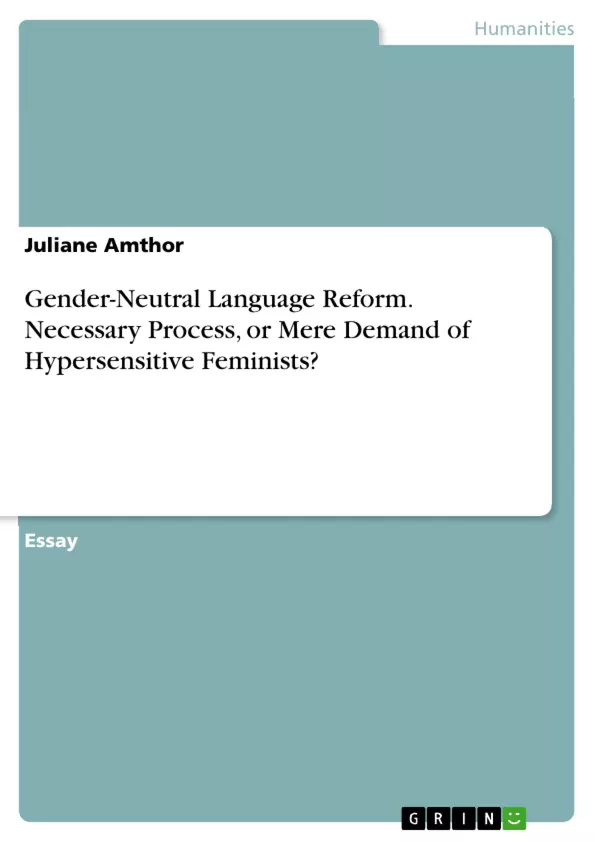What has been ridiculed by male columnists as feminists’ “pronoun envy”, and exaggeratedly depicted as their wish to change words like ‘manhole cover’ to ‘personhole cover”, and ‘manipulate’ to ‘personipulate’, in fact, is too important and well-grounded a demand to be ridiculed. Emerging in the 1960s / 70s, the issue of sexist language by many is still seen as a persistent problem today. The continuity of this claim shows that feminists in favour of gender-neutral language use are by no means concerned with trivialities, but with core concepts of language. (Cf. Penfield 1987:6)
This essay is based on the positive statement of the above quotation that meanings are not fixed, but language responds to new demands posed on it by its speakers. Its aim is to prove that, especially in English with its natural gender system, strong sexist tendencies exist, and therefore language reform is possible and necessary to contribute to the formal and actual equality of women.
Inhaltsverzeichnis (Table of Contents)
- Gender-Neutral Language Reform - Necessary Process, or Mere Demand of Hypersensitive Feminists?
- The Importance of Language
- The Nature of Gender in English
- Gender Bias in English
- Gender-Neutral Alternatives
Zielsetzung und Themenschwerpunkte (Objectives and Key Themes)
This essay aims to demonstrate the existence of strong sexist tendencies in the English language, particularly within its natural gender system, and argues for the necessity of language reform to promote the formal and actual equality of women.
- The influence of language on perception and reality
- The evolution of gender systems in English
- The prevalence of gender bias in English language and its social implications
- The potential for gender-neutral language reform in English
- The impact of gender-neutral language on women's equality
Zusammenfassung der Kapitel (Chapter Summaries)
- This chapter explores the relationship between language and perception, arguing that language can influence how we understand the world. It introduces the theory of linguistic determinism, which posits that the structure of language shapes our worldviews.
- This chapter focuses on the historical development of gender in English, tracing its evolution from a grammatical gender system to a natural gender system. It contrasts the grammatical gender systems of languages like German and French with the natural gender system of English.
- This chapter examines the persistence and pervasiveness of gender bias in English, despite its natural gender system. It argues that the use of pronouns in English reflects social attitudes and convictions, contributing to the perpetuation of gender inequality.
Schlüsselwörter (Keywords)
This essay focuses on the themes of gender-neutral language reform, sexism in language, linguistic determinism, gender systems in English, and the social impact of language. It highlights the importance of language as a tool for promoting equality and challenging existing power structures.
Frequently Asked Questions
Is gender-neutral language reform just a demand of "hypersensitive feminists"?
No, the essay argues that it is a well-grounded demand addressing core concepts of language that reflect and perpetuate social inequality.
What is the difference between grammatical and natural gender?
English uses a natural gender system (based on biological sex), whereas languages like German or French have grammatical gender systems for all nouns.
What is linguistic determinism?
It is the theory that the structure of a language shapes the way its speakers perceive and understand the world around them.
Does English have sexist tendencies despite its natural gender system?
Yes, the essay demonstrates that strong sexist biases exist in English, such as the use of masculine pronouns as generic terms, which influences social perception.
Why is language reform necessary for equality?
Because language responds to the demands of its speakers; reforming it can contribute to the formal and actual equality of women in society.
- Citar trabajo
- Juliane Amthor (Autor), 2012, Gender-Neutral Language Reform. Necessary Process, or Mere Demand of Hypersensitive Feminists?, Múnich, GRIN Verlag, https://www.grin.com/document/307712



